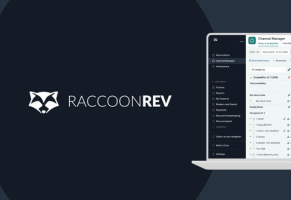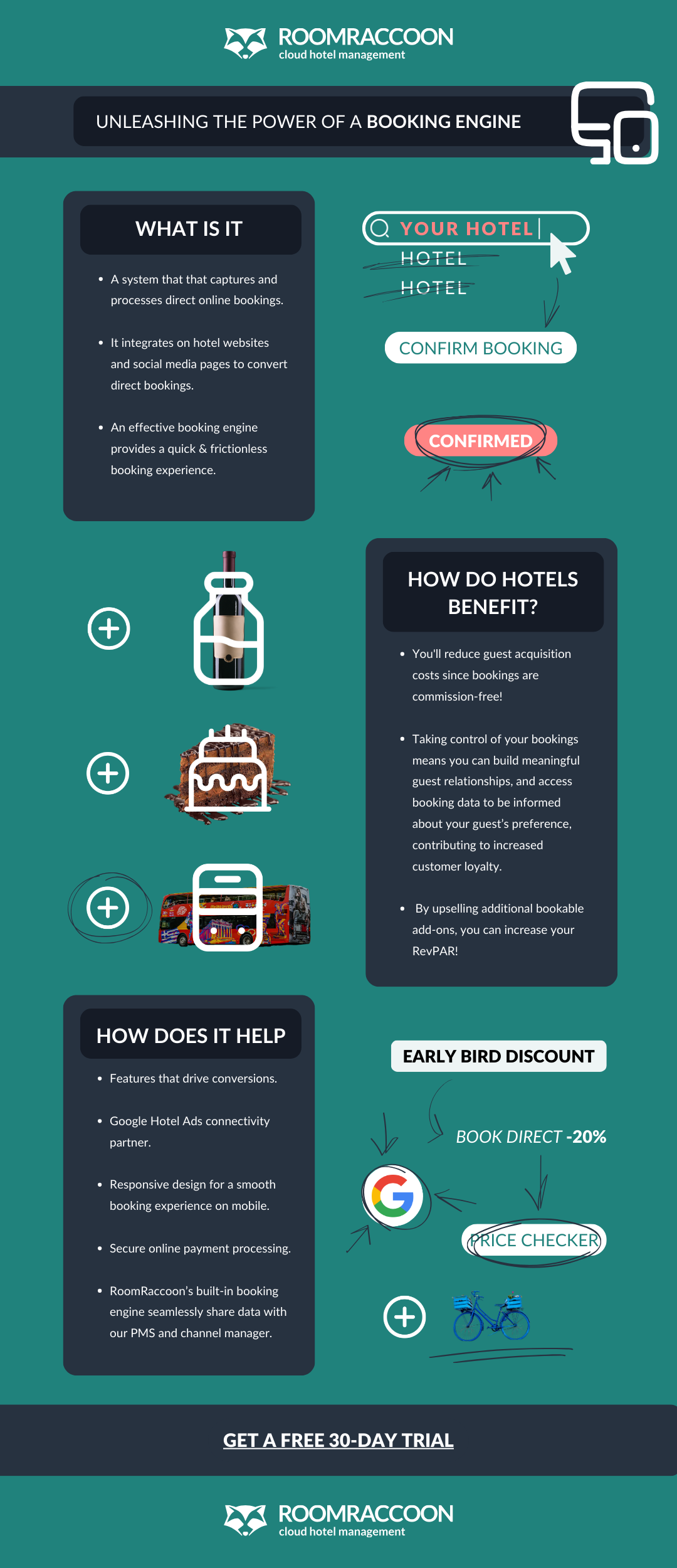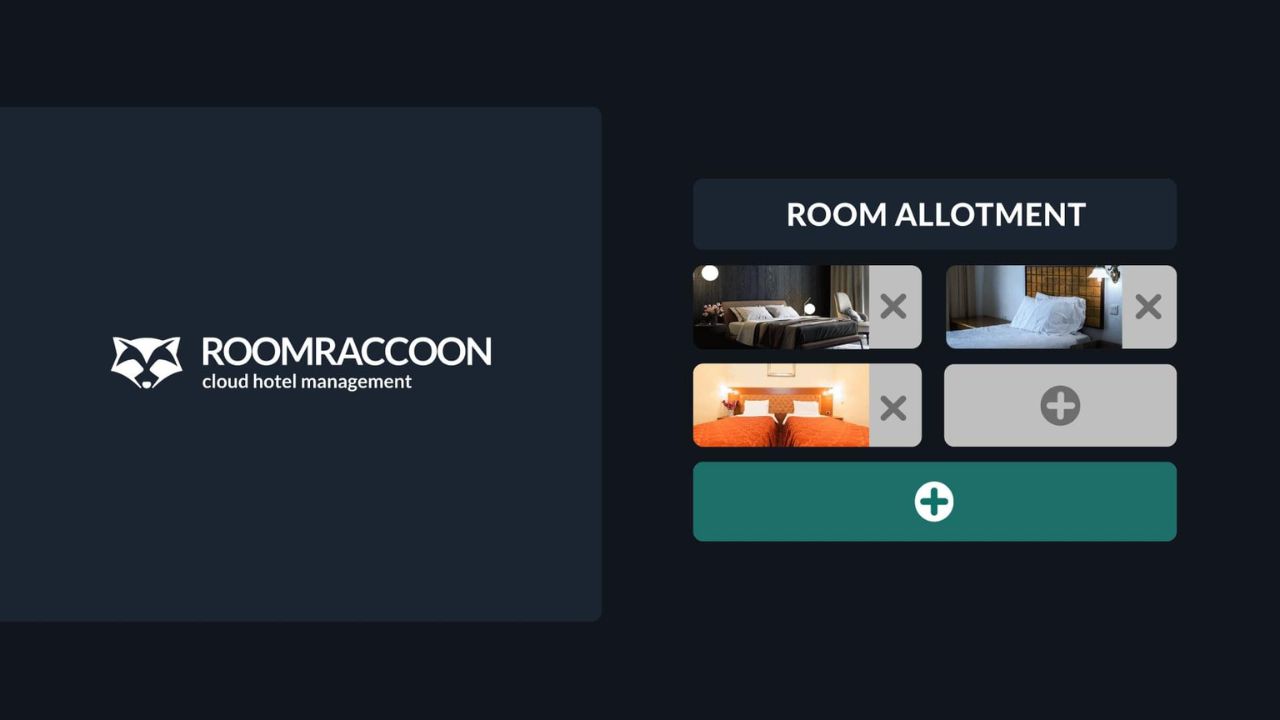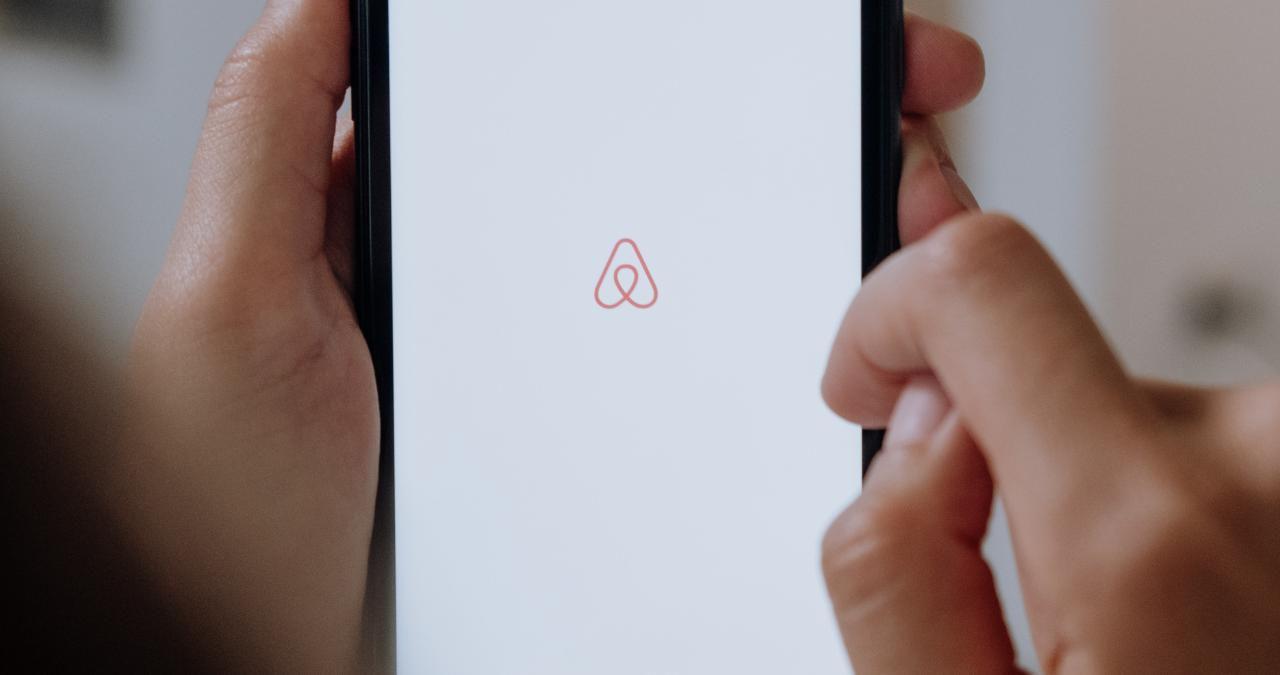OSNOVNI PROIZVOD
What is a Hotel Booking Engine?
16 studenoga, 2023 Nicky. M
Podijelite ovaj članak
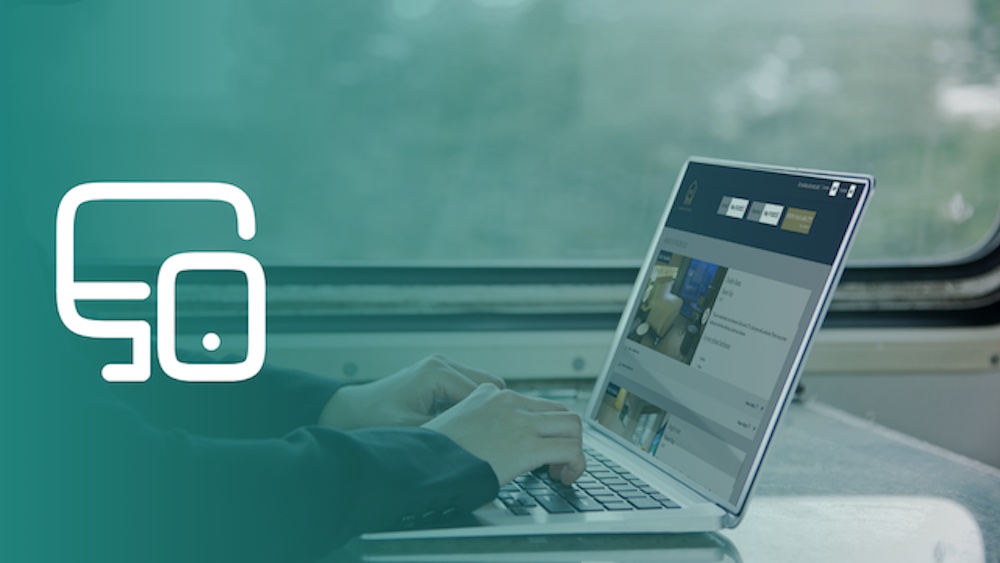
A hotel booking engine is a system on your hotel’s website and social media pages. Its main job? To smoothly handle direct online bookings without the headache of commission fees. This tool lets you fine-tune your sales approach, build stronger guest relationships, and boost revenue.
While online travel agents can spread the word about your hotel to a broader audience, the downside is dealing with hefty commission fees. The booking engine steps in to help your hotel strike a balance in its distribution strategy, preventing online travel agents from taking over and cutting into your earnings.
This blog provides a comprehensive guide to hotel booking engines, including their functionality, little-known benefits, and how hotels can leverage them.
How Does a Booking Engine Work?
There are many booking engine software providers, and each booking engine varies in functionality and appearance. However, the typical structure of a booking engine involves a page where potential guests can enter their preferred stay dates. This input triggers the booking engine to display the available room options to prospective guests. Once they have made their selection, they are taken to a secure payment or confirmation page to complete their booking.
It’s worth noting that if the booking process takes too long with too many steps, guests won’t follow through. RoomRaccoon’s direct booking process is simple, quick, and secure, consisting of 5 simple steps.
RoomRaccoon’s 5-step direct booking process
Step 1: The guest selects the dates for their stay and provides the number of accompanying guests, including children.
Step 2: The guest views available room rates and packages based on the provided details and selects the most suitable one.
Step 3: The guest can also conveniently choose to include add-ons like a bottle of wine or a flower bouquet to personalize their stay.
Step 4: Prije konačne potvrde rezervacije, gost može pregledati sadržaj svoje košarice, uključujući sve dodatne troškove.
Step 5: The guest receives a booking confirmation email with information about their upcoming stay.
How to use a booking engine on your social media pages
Facebook: The Facebook interaction button is a handy way to start talking to potential guests. It can also lead them straight to your booking engine for room reservations, which works well, especially on mobile devices.
TikTok: TikTok Business Accounts offer the option to include a booking engine link in video post descriptions, and you can also add it to your bio for easy access.
Instagram: An Instagram Business Account is the type of profile that allows you to have access to free business tools. You have the option to include the booking engine link in your property’s Instagram page bio. Alternatively, if you use shopping tools like Linktree, you can easily create a dedicated button to encourage followers to book directly.
Top 7 Features of a High-Performing Booking Engine
Nowadays, nearly all hotels have their own website equipped with a booking engine that allows guests to book their stay. However, not all booking engines are created equal. As the hospitality industry continues to evolve, guests are becoming more tech-savvy, and competition is getting tougher.
That’s why you need a booking engine that not only processes bookings but is equipped with features that can help convert more visitors into actual bookers. RoomRaccoon’s booking engine goes beyond the ordinary with modern features that enhance your hotel’s online booking process.
1. A price comparison widget
If you’re familiar with the OTA billboard effect, you know that travelers do not make quick booking decisions; they like to compare options and pricing. Today’s savvy travelers prefer to use Online Travel Agencies (OTAs) for initial research, but they often switch to the hotel’s own website for better rates. By implementing a price comparison widget like Provjera cijena rakuna, you can save time for your guests by displaying your rates on both OTAs and your own website. This will help guests see that they’re getting a better deal by booking directly, and you avoid hefty commission fees.
2. Discount code generator
Your booking engine should be able to generate custom discount codes that can be easily redeemed through the booking engine, opening up a world of promotional possibilities to attract and retain loyal customers. The most common way RoomRaccoon users utilize this feature is by offering a direct booking discount on their website through a pop-up banner. Take a look at the example below from O’Two Hotel, one of our partners in South Africa.
One way to encourage repeat bookings is by sending past guests an email with a direct booking discount code. You can make this even more special by sending it to them on their birthday or other special occasions.
3. Multi-property dropdown
Do you run a multi-property hotel? Instead of having an individual booking engine for each property, using a multi-property booking engine is more efficient for guests to select a location from a drop-down menu. They can view the availability of the property in their desired location and book accordingly. As a hotelier, you benefit from centralized management and improved occupancy across your entire portfolio.
4. Add-ons and upsells
Today’s guests are seeking more than just a place to sleep; they want an experience. They are willing to spend more on additional amenities that can enhance their stay. As a hotelier, it is crucial to take advantage of this opportunity by utilizing a booking engine that enables guests to book add-ons for other services you offer. This will ultimately increase your total revenue per available room. Take a look at the variety of bookable add-ons for a self-catering lodge.
5. Room Allotment
If you cater to group events like functions and weddings, you might be aware of the difficulties of coordinating room allocation with a travel booker. One of the most valuable features of RoomRaccoon’s booking engine is Room Allotment, which allows you to assign rooms to a group profile and send a custom booking engine link to the wedding planner or travel agent. The custom booking engine will only display and allow bookings for the rooms that have been allocated for the event. In the case of a wedding, guests can book their own rooms and select the add-ons they want. No hassle!
6. White labeling
You should have the option to customize the booking engine with your brand’s identity. White labeling ensures that your brand remains front and center throughout the entire booking process. From the URL to the confirmation documents, it’s all about your hotel’s identity. This consistency helps in building and reinforcing brand recognition.
7. Yield management
Seasonal rates are important for hotels. However, it’s worth noting that demand for hotel rooms can also fluctuate outside of peak season, especially during major events. For instance, hotel occupancy rates soared to 90% during Taylor Swift’s Eras tour. This highlights the significance of monitoring demand and adjusting room rates accordingly to maximize revenue and occupancy rates. A booking engine with intelligent pricing tools like a Yield Manager can make a big difference to your bottom line.
Learn more about yield management in the hotel industry.
Benefits of Using a Hotel Booking Engine
I prefer to use OTAs to sell, market, and manage my bookings because it is simpler.
OTAs are convenient as they handle customer relations, booking management, and payments on behalf of hotels. However, the major downside is the hefty commission fee per booking hotels pay for using this service. That’s why striking a strategic balance between OTA and direct bookings proves more financially rewarding. Prioritizing direct bookings not only reduces commission costs but also unlocks additional perks, such as:
Guest loyalty: Guests who book a stay directly through a hotel’s website have a higher likelihood of returning. This is because guests have a personalized, transparent, and connected experience right from the start instead of taking the impersonal OTA route. A booking engine plays a crucial part in the initial stages of a connected guest journey, and the positive interactions and incentives provided during the direct booking process contribute to increased customer loyalty.
OTA billboard effect: OTAs can be powerful marketing tools that indirectly boost your direct bookings. That’s because online-savvy travelers who find an attractive property on an OTA tend to look up the property’s website for a better deal or to find more information. If you have implemented a booking engine with a competitive direct booking rate, you score commission-free bookings!
Owning the guest relationship: Taking control of your own bookings means you can build meaningful guest relationships that are centered around your hotel’s brand, ethos, and values. This appeals to modern travelers who want to feel a sense of connection to the brands they choose.
Enjoy access to more booking data: You will have access to more booking details, allowing you to stay informed about your guests’ preferences, store necessary customer information for post-stay marketing, and set booking terms.
Here are a few things you can control with RoomRaccoon’s booking engine:
- Choose the information fields that guests must complete (name, email address, time of arrival, dietary requirements, etc).
- Select a pre-payment amount (%) or full payment.
- Set conditions like the latest arrival time and maximum bookable stay.
- Personalize the booking confirmation document with a warm greeting and booking details.
- Get a competitive edge by offering unique rates and packages that differentiate your property.
11 Key Questions for Choosing a Booking Engine
Shopping around for booking engine software? Be prepared! Here are key questions to ask vendors to help you better understand the inner workings and ensure you make the right investment.
1. How can I manage my rates and availability?
A powerful booking engine should have a reservation or property management system that stores your inventory (availability and rates). This makes it easy for reservation managers to seamlessly add, modify, and delete items from your inventory without altering existing bookings. On top of that, it can recognize repeat guests, enabling you to deliver a more personalized booking experience.
By linking to your reservations calendar, the system ensures that your availability is always up-to-date. This means that when a guest makes a booking, they can be confident that the room they want is available.
RoomRaccoon’s booking engine works alongside our integrated channel management software to ensure that all bookings from OTAs and third-party channels are synced with your reservations calendar. This eliminates the risk of overbooking and ensures a consistent, accurate view of your occupancy levels across all channels.
2. Is it quick and user-friendly?
The process of booking a room should be quick, trustworthy, and hassle-free.
Prospective guests should be able to select their arrival and departure dates and number of guests to view suitable room options. What if you’re sold out for a particular date range? RoomRaccoon’s booking engine automatically suggests the closest alternative dates to diversify options. And, should you run multiple properties, our multi-property dropdown menu is ideal for increasing your occupancy across your entire portfolio.
Buyer’s Tip: It’s helpful to test the booking process from the point of view of a potential guest.
3. Is it responsive?
Mobile bookings are becoming increasingly popular.
Your booking engine should adjust to the different types of devices travelers are using so that the booking experience is just as smooth on a mobile or tablet as on the desktop version. The text and images should be clear and easily clickable.
Buyer’s Tip: Google favors websites that are functional on both desktop and mobile. As a result, it sends more traffic to websites that provide a better user experience for mobile users.
4. How can I cater to international travelers?
Nobody enjoys the hassle of dealing with currency conversion while booking online. International travelers represent a highly profitable market to target, as they tend to stay for longer and indulge in room upgrades and additional amenities.
To cater to this demographic effectively, it’s important that the booking engine you choose is multilingual and can seamlessly handle various currencies.
5. Is it customizable to my hotel’s branding?
You aim to establish a seamless experience for potential guests from the moment they land on your website to the point when they proceed to book through your booking engine. If your booking engine appears significantly different from your website’s branding, it could potentially trigger apprehension and distrust.
A modern online booking engine should offer customization options. With RoomRaccoon’s booking engine, you have the ability to craft a unified brand experience by personalizing your booking engine’s logo, colors, and fonts. Moreover, you can effortlessly upload over 20 room images for each room category.
6. Can I promote multiple rate plans and upsell additional services?
OTAs typically enforce fixed-rate plans, but the advantage of having your own website booking engine is the flexibility to tailor your rate plans and packages to align with your business goals and delight your guests.
This customization allows you to offer varying rates for the same room, catering to different packages and inclusions, such as a bed and breakfast rate or room only, refundable or non-refundable rates for the same room. RoomRaccoon’s booking engine takes it a step further by enabling your guests to personalize their stay with a variety of add-ons they can book along with their accommodation. Quite convenient!
7. Can I process secure online payments?
An essential part of owning your booking experience is having complete control over payments and booking conditions. The option to receive full or partial payment during booking can prevent last-minute cancellations and no-shows, providing you with peace of mind. RoomRaccoon also offers the convenience of online check-in payments, allowing guests to complete their registration and pay a few days before arrival.
When it comes to online payments in the hospitality industry, it’s important to prioritize secure and reliable online payments. To achieve this, it’s recommended to use a payment gateway that meets high-security standards like 3D secure two-factor authentication. RoomRaccoon’s integrated payment gateway, RaccoonPay, ensures the safe exchange of payment data between hotels and guests. It also centralizes all financial information in a single location, making it easier to record and monitor transactions.
8. Will I pay a commission for direct bookings?
The beauty of managing your own booking experience is that you get to keep all your revenue. However, not all booking engine providers offer this perk. It’s crucial to inquire whether they charge any commissions on your bookings when you’re exploring new software options.
RoomRaccoon has processed over one million commission-free direct bookings!
9. Can I connect my booking engine to Google?
If you’re serious about bolstering your direct bookings, you should include Google Hotel Ads (GHA) in your distribution strategy. The Pay-Per-Stay program launched in 2020 at an advantageous time when cancellations were at an all-time high during the pandemic.
Instead of paying for each click or transaction, hotels could finally pay Google a commission only after the guest’s stay occurred. Hotel managers highly favor the no-risk model, which is responsible for a large chunk of direct revenue.
Unlike OTAs, GHA sends guests directly to your hotel booking engine, giving you complete control over the booking experience. RoomRaccoon is a certified connectivity partner of Google, which means you can activate the ads instantly—no set-up hassle.
10. How can I track my online marketing campaigns?
Do you run advertising campaigns on platforms like Google or Meta? If you do, it’s crucial that your booking engine enables you to use conversion tracking codes from these platforms. This will give your marketing team insights into how effective your booking engine is in converting visitors into bookings.
11. Can I get a free booking engine trial?
Before you decide to commit, it’s important to take advantage of a trial period. During this time, you should try out different rate configurations, check out customization options, and see how the booking engine looks from a guest’s point of view. This hands-on experience will help you make informed decisions and feel more confident about your chosen software.
RoomRaccoon offers a no-strings-attached free trial for 30 days. Give it a go today!
Other Useful Tools to Use With Your Booking Engine
A booking engine is only as good as its integration with other systems. It’s crucial that a booking engine can harmonize with other systems you utilize to guarantee the precision and efficiency of your property’s backend operations.
A practical solution for small and independently owned hotels is all-in-one hotel management software that’s complete with the core tools you need to operate your business effectively, including a booking engine, property management system, channel manager, and Google Hotel connection.
1. Property Management System (PMS)
A PMS is software that controls your property’s back and front-end operations and is an important integration with any booking engine. With modules such as Property Set-Up, Reservations, Bookers & Guests, Documents, Reports, Finance, Housekeeping, and Payments, RoomRaccoon’s PMS offers you a complete property management experience.
RoomRaccoon’s PMS with a built-in booking engine automatically syncs availability and makes updating or modifying rates easy. On top of this, new reservations are automatically added to the reservations calendar for easy viewing.
2. Channel Manager
A channel manager is a very important tool that allows hotels to sell on multiple channels simultaneously. It ensures that your availability is always up-to-date, no matter where your guests book; be it directly on your website or through an OTA like Booking.com. This saves you time and effort and prevents overbookings.
RoomRaccoon was voted the World’s Best Channel Manager by the World Travel Tech Awards in 2023.
3. Google Hotel Ads
Another important tool you can use alongside your booking engine is Google. Google hotel ad campaigns not only showcase your competitive direct rates but also offer a seamless booking option, directing potential guests straight to your booking engine. Use it to compete with major OTAs and enjoy more direct bookings. Keep in mind that Google only works with certified booking engine partners like RoomRaccoon.
Learn more about Google Ads for hotels in our comprehensive guide.
Hotel Booking Engine Providers
There are numerous hotel booking engine providers available in the market, each suited for different types of properties, such as independent hotels, hotel chains, boutique hotels, and bed and breakfasts.
Preferred by independent hotels and other accommodation providers like bed and breakfasts, lodges, apartments, and hostels, RoomRaccoon offers an all-in-one platform with an integrated hotel booking engine that gives hoteliers everything they need to take commission-free direct bookings, personalize guest service, grow revenue, and save time.
How to Implement a Hotel Website Booking Engine
Once you have chosen a provider, it should be straightforward to implement your hotel website booking engine.
Most booking engine providers can integrate with your existing website without any problems. If you don’t have a website yet, don’t worry; there are providers like RoomRaccoon that offer website builders that make it easy to create one.
Use RoomRaccoon’s Hotel Booking Engine to Boost Direct Bookings and Delight Guests
The RoomRaccoon hotel booking engine not only processes direct booking on your website but is engineered with features that encourage higher conversion rates and booking values.
Robust, simple, and fully optimized, RoomRaccoon’s booking engine will help you boost direct bookings quickly and grow your hotel’s revenue.
- Increase direct revenue: Take direct bookings without commissions from your website, social media pages, and metasearch channels like Google.
- Enhance guest experience: Create a frictionless booking experience, offer personalized stays, and be optimized for any device.
- Stay in control and keep it simple: Enjoy effortless management of your reservations, processing of payments, and valuable insights.
Experience it yourself by booking a free demo today!
Pratite nas
Nicky. M
Nicky is RoomRaccoon's Senior Content Manager, combining a love for travel with a practical approach to improving hotel performance through tech and insightful tips. Join her journey where travel, hospitality, and technology meet.
Povezani članci
Pretplatite se na naš newsletter za više ovakvih i sličnih informacija u vašem inboxu!


